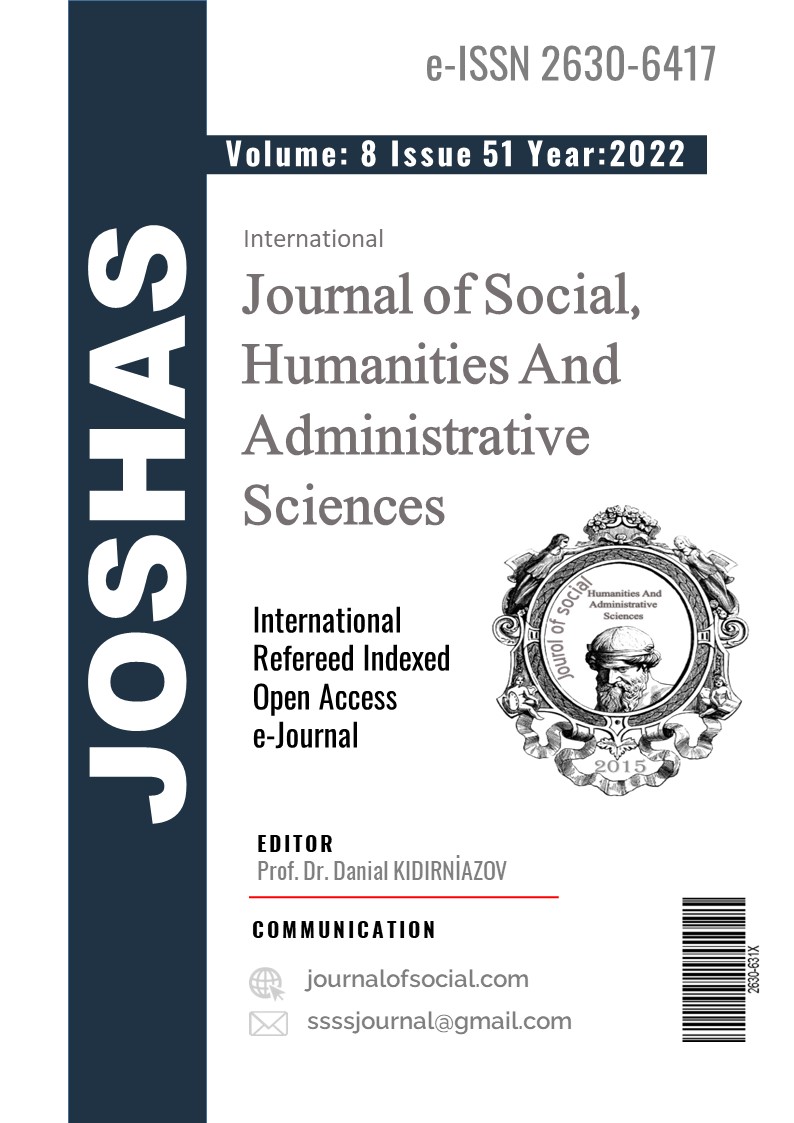Author :
Abstract
Roman sanatı dokümanlardan oluşmadığı için kişinin veya toplumun yaşadığı travmalar, acı ve işgaller bu tür vasıtasıyla hayal dünyasına hitap edecek şekilde hikâye edilebilmektedir. XVII. Yüzyıldan itibaren kullanılmaya başlayan roman türü bu süre zarfında değişim ve gelişim göstererek günümüze değin gelmiştir. Birinci dünya savaşı sonrasında Ortadoğu ülkelerinin yabancılar tarafından işgal edilmesi bu çalışmaları kimi zaman sekteye uğratmış kimi zamanda diğer Ortadoğu ülkelerine ulaşmasına engel olmuştur. Abdurrahman Münif XX. Yüzyıl Modern Arap Edebiyatının önemli temsilcilerinden birisidir. İncelediğimiz Şarku’l-Mütevassıt isimli eserde, demokrasi kavramının olmadığı toplumlarda otoriteye zıt fikirlerin nasıl cezalandırıldığını roman olarak kurgulamıştır. Bununla birlikte romanda, fikirleri sebebiyle mahkûm olanları, hapishaneleri ve otoriter rejimlerin bunlar üzerindeki etkilerini de konu edinmektedir. Yazar edebiyatçı kimliğinin yanı sıra akademisyen, petrol mühendisi ve ekonomisttir. Birçok süreli yayında yazılar kaleme almış ve OPEC bünyesinde danışman olarak da görev yapmıştır. Münif ülkesinin vatandaşlığından çıkartıldıktan sonra kendisini yazmaya adamıştır. Doğuyu ve batıyı tanıyan yazar içinde yaşadığı toplumun güncel sorunlarını Avrupa ile mukayese ederek çözümler aramaktadır.
Keywords
Abstract
Since the art of the novel does not consist of documents, traumas, pain and occupations experienced by the person or society can be told in a way that appeals to the world of imagination through this genre. XVII. The novel genre, which has been used since the 19th century, has survived to the present day by showing changes and developments during this period. The occupation of Middle Eastern countries by foreigners after the First World War sometimes interrupted these efforts and sometimes prevented them from reaching other Middle Eastern countries. Abdurrahman Munif XX. He is one of the important representatives of 19th Century Modern Arabic Literature. In the work named Novel East of The Mediterranean, which we examined, he fictionalized as a novel how ideas contrary to authority are punished in societies where the concept of democracy does not exist. In addition, the novel also deals with those who are convicted for their ideas, their prisons, and the effects of authoritarian regimes on them. In addition to his literary identity, the author is an academician, petroleum engineer and economist. He has written for many periodicals and worked as a consultant for OPEC. After being stripped of his country's citizenship, Munif devoted himself to writing. The author, who knows the east and the west, seeks solutions by comparing the current problems of the society he lives in with Europe.
Keywords
- Abdurrahmân Münîf, el-Kırâa ve’n-Nisyân el-Hurûc Min Muduni’l-Milh, Tuwa Media Publishing, Londra, 2015.
- Abdurrahmân Münîf, el-Kırâa ve’n-Nisyân el-Hurûc Min Muduni’l-Milh, Tuwa Media Publishing, Londra, 2015.
- Abdurrahman Münif, ed-Demokrâtiyye Evvelen… ed-Demokrâtiyye Dâimen, el-Müessesetü’l-Arabiyye lid’Dirâse ven’Neşr, Beyrut, 1985
- Ahmet Yıldız, “Murîd el-Berğûsî’nin Raeytu Râmallah İsimli Romanının Teknik ve Tematik İncelemesi”, Cumhuriyet İlahiyat Dergisi 25/1, Haziran 2021
- Ali Eminoğlu, “Muhammed Hasan Alvân’ın ‘Mevtun Sağîrun’ (Küçük Bir Ölüm) Adlı Romanının Teknik ve Tematik İncelemesi”, Necmettin Erbakan Üniversitesi İlahiyat Fakültesi Dergisi 46/46, 2018
- Amine Yûsuf, Tekniyyâtu’s-Serd fi’n-Nazariyye ve’t-Tatbîk, El-Müessese el-Arabiyye li’d-Dirâse ve’n-Neşr, Beyrut, Balcı, Musa, Taşa Kazınmış Sözler, Büyüyen Ay Yayınları, İstanbul, 2016
- Berna Moran, Edebiyat Kuramları ve Eleştiri, İletişim Yayınları, İstanbul, 2005.
- Bourneur, Roland - Quellet, Réal. Roman Dünyası ve İncelemesi. çev. Hüseyin Gümüş. Ankara: Kültür Bakanlığı Yayınları, 1989.
- Çıkla Selçuk, “Romanda Kurmaca ve Gerçeklik”, Hece Dergisi, Yıl: 6, Sayı: 65/66/67, Mayıs/Haziran Temmuz, 2002.
- Edward Morgan Forster, Roman Sanatı, çev. Ünal Aytür, Adam Yayınları, İstanbul, 2001 Fatih Tepebaşılı, Edebiyat Bilimine Giriş, Çizgi Kitabevi, 2015
- Fatih Tepebaşılı, Roman İncelemesi, Çizgi Kitabevi, İstanbul, 2019
- Faysal Derrâc, Abdurrahmân Münîf ve Rivâyetu’l-İltizâm, Merkezu’d-Dirâsâti’l-Vahdeti’l-Arabiyye, Beyrut,2012Hasan Harmancı, “Abdurrahman Munîf’in el-Escâr ve İğtiyâlu Merzûk Adlı Romanının Teknik Yönden İncelenmesi”, Selçuk Üniversitesi Edebiyat Fakültesi Dergisi 30 (2013)
- Hasen Behrâvî, Bunyetu’ş-şekli’r-rivâî, el-Fezâ’-ez-Zemene’ş-Şahsiyye, el-Merkezu’s-Sekâfiyyu’l-Arabî, Beyrut,İlknur Emekli, “Abdurrahmân Münîf ve Risâle Min Verâi’l-Hudûd Adlı Kısa Öyküsü”, Atatürk Üniversitesi Güzel Sanatlar Enstitüsü Dergisi, sayı: 35, Erzurum, 2015
- Judith Gabriel, “Bidding Farewell to Munif, Novelist Bears Witnes to Repression, Corruption, Reverence for CommonFolk”, Al-jadid, Vol, 9, 45 Fall, 2003
- Mehmet Bakır Şengül, “Romanda Zaman Kavramı”, Uluslararası Sosyal Araştırmalar Dergisi 4/16 (2011)
- Mehmet Önal, “Edebî Dil ve Üslup”, Atatürk Üniversitesi Türkiyat Araştırmaları Enstitüsü Dergisi 36, 2008 Mehmet Tekin, Roman Sanatı 1 Romanın Unsurları, Ötüken Neşriyat, İstanbul, 2012
- Meral Demiryürek, “Kurgusal Metinlerde İkinci Kişili Anlatıcı ve Bakış Açısı”, FSM İlmî Araştırmalar İnsan ve Toplum Dergisi, 2, (2013)
- Nabih Kassem, el-Fennu’l-Rivâiyy İnde Abdurrahman Münîf, el-Mekân, ez-Zamân, el-Şahsiyye, Tel Aviv Üniversitesi, Edebiyat Fakültesi, Arap Dili ve Edebiyatı Bölümü (Yayınlanmış Doktora Tezi), Mart, 2002
- Nurullah Çetin, Roman Çözümleme Yöntemi, Öncü Basımevi, Ankara 2003
- Özcan Gürbüz, “Düşünce ile Tema ve Konu”, Kurgu Dergisi 18, 2001
- Philip Stevick, Roman Teorisi, (çev. Sevim Kantarcıoğlu), Gazi Üniversitesi Basın-Yayın Yüksekokulu Matbaası, Ankara, 1988
- Ronald B. Tobias, Roman Yazma Sanatı, çev. Mehmet Harmancı: Say Yayınları, İstanbul, 1996 Şerif Aktaş, Roman Sanatı ve Roman İncelemesine Giriş, Akçağ Yayınları, Ankara, 1991
- Ülkü Tuğrul, Abdurrahman Münif Şarku’l-Mütevassıt İsimli Romanın İncelenmesi, Dicle Üniversitesi Sosyal Bilimler Enstitüsü, (Yayımlanmamış Yüksek Lisans Tezi), Diyarbakır 2006
- Yumnâ el-‘Îd, Tekniyyâtu’s-Serdi’r-Rivâî fî Davi’l-Menheci’l-Bünyevî, Dâru’l-Fârâbî, Beyrut, 2010





